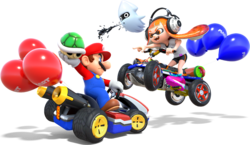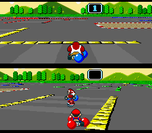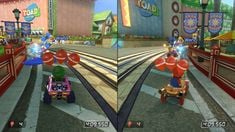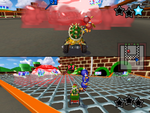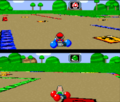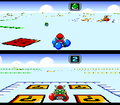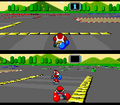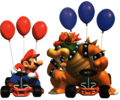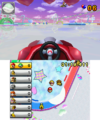Battle
- This article is about the mode in the Mario Kart series. For the mode in Super Mario Bros. 3, see Mario Bros. (Super Mario Bros. 3). For the type of minigame in the Mario Party series, see Minigame § Battle minigames.
Battle (also known as Battle Mode) is a game mode featured in the Mario Kart series. It was included as an alternative for regular races in order to add variety. Unlike regular races, Battle mode takes place in specially designed battle courses, which are flat, enclosed arenas that are smaller than normal racetracks, but still contain various obstacles, and come in different layouts. An exception is Mario Kart 8, where the battle takes place in select racetracks instead of battle courses. However, Mario Kart 8 Deluxe returns to the traditional arena-based battle. Mario Kart Wii's battle courses are unique in their feature as that they change throughout the battle, either periodically (Thwomp Desert) or once for all (Block Plaza, Delfino Pier, and Chain Chomp Wheel). The only course in the game to which this does not apply is Funky Stadium.
Originally, in the first four games, Battle mode is only available in multiplayer. Starting in Mario Kart DS, Battle mode can be a single player mode with computer players or a multiplayer mode with or without them. Starting with Mario Kart: Double Dash!!, there are usually at least two different battle options.
Since Mario Kart Wii, Battle mode has a different countdown sound at the start; instead of the regular beeps heard in normal races, they are replaced by air horns, with the only exception being Mario Kart Tour.
The items that are usable change as well. Items such as the Bullet Bill, Chain Chomp, Crazy Eight, and Spiny Shell (except in Mario Kart Wii) do not appear in Battle mode, and Lightning also does not appear in Balloon Battle or Coin Runners (both except in Mario Kart Wii). On the other hand, the Feather in Mario Kart 8 Deluxe and Mario Kart Tour is exclusive to Battle mode.
In all games, the engine class of Battle mode is fixed to 50cc. An exception is the Renegade Roundup mode from Mario Kart 8 Deluxe where it is increased to 100cc.
Battle mode was added into Mario Kart Tour in the Battle Tour, in October 2022, where alongside being available as a multiplayer mode, battle courses can also be found as part of cups. All battle courses use SNES Battle Course 1's music from Mario Kart 8 Deluxe instead of their original music tracks or renditions thereof.
Though a staple for the series, Battle mode is absent from the Mario Kart Arcade GP series and Mario Kart Live: Home Circuit.
Modes[edit]
Balloon Battle[edit]
Balloon Battle debuted in Super Mario Kart and has appeared in all console installments since then. In this mode, players must use items to hit the opposing player to pop one of the three balloons. If all balloons are popped, the player is out and termed as "sidelined." It is the only gameplay mode present in the mode, where it was titled "Battle Mode." Later installments change the mechanics, such as being based on balloons popped rather than being the last man standing.
Mario Kart 64, Mario Kart: Super Circuit, and Mario Kart: Double Dash!! have four-player support, allowing up to four players to battle, unlike Super Mario Kart, where it is limited to two players. The latter game's LAN Mode even allows up to eight players (sixteen with Co-op Play) to play in Battle mode. In Mario Kart 64 and Mario Kart: Super Circuit, once a player loses all of their balloons, they turn into a Mini Bomb Kart or a Bob-omb, respectively. In this form, they can ram into other players to blow them up and pop their balloons, although after doing so in Mario Kart 64, they do not respawn. Getting hit by items does not cause it to explode.
Mario Kart DS has a few changes to Balloon Battle. For the first time, it can be played in single-player, unlike the previous four games, which require being in multiplayer to play. The player also starts out with one balloon instead of three, and more can be blown by holding or by blowing into the
![]() . There are four balloons in reserve (five in total), and the kart has to be stopped before blowing another balloon. The player can only choose the Standard Kart in this mode. In this game, there are eight different colors the balloons can be. Those colors are blue, cyan, green, orange, pink, purple, red, and yellow.
. There are four balloons in reserve (five in total), and the kart has to be stopped before blowing another balloon. The player can only choose the Standard Kart in this mode. In this game, there are eight different colors the balloons can be. Those colors are blue, cyan, green, orange, pink, purple, red, and yellow.
Mario Kart Wii introduced many changes to Balloon Battle. The match is now timed to three minutes, and the objective is to pop the most balloons within that time limit instead of the traditional last-man-standing setup. The characters are now divided into two teams; free-for-all matches are not available. A new addition to this game is the ability to respawn after losing all balloons; this causes one point to be deducted from the team's total points.
Mario Kart 7 allows players to battle in two teams or in a free-for-all match. The time limit of the match is reduced to two minutes, and when losing all balloons, players now lose 1 to 3 points instead of a single one as in Mario Kart Wii. In addition, any vehicle can be used for Battle mode, like in Mario Kart: Double Dash!!, and unlike Mario Kart DS and Mario Kart Wii, which only let players use the Standard Kart and Standard Bike in the mode. Like in Mario Kart DS, there are eight different colors the balloons can be. Those colors are black, blue, cyan, green, purple, red, white, and yellow.
Mario Kart 8's battles take place on regular racecourses throughout the game alongside the rules changing again: it combines the survival mechanic used in older games and the timed point-based setup of the previous two installments. Players start with three points, and losing a balloon will deduct one point. If all balloons are popped, they are out of the game, but in team mode or multiplayer, players can still participate as a ghost and cannot gain more points. Appearing transparent on the player's screen but invisible to everyone else, they can still use items to harm the other players, and can still win if the player manages to reach enough points prior to losing all balloons. Balloon Battle is the only Battle mode option available in Mario Kart 8. As a result of some of these modifications, the Battle mode in Mario Kart 8 has been criticized for the lack of original battle stages.[1] In this game, when playing with no teams, there are twelve different colors the balloons can be. These colors are black, blue, brown, cyan, green, lime, orange, pink, purple, red, white, and yellow. The balloons also have the Mario Kart logo on them.
Mario Kart 8 Deluxe changes the Battle mode rules to the setup last used in Mario Kart 7 with new battle arenas and some changes. Just like in Mario Kart Wii and Mario Kart 7, Balloon Battle uses the timed point-based scoring system rather than the last-man-standing formula and can be played either in teams or free-for-all. There are also now 1.5 seconds of invincibility frames, unlike the Wii U version. Each player now starts out with five balloons rather than the traditional three, and losing all balloons halves the player's points, regardless of how many points they have. The player respawns with three balloons instead of five. The details of the balloons are the same as in Mario Kart 8 (including the twelve colors).
Mario Kart Tour's rendition of Balloon Battle is similar to that of Mario Kart 8's, where losing all of one's balloons will result in being eliminated, but there is still a time limit present. In this game, much like how races only have two laps instead of three, players only start with two balloons instead of three in Battle mode. Once a player loses all of their balloons, their kart will be put on a Lift that circles the perimeter of the stage. When the player hits an Item Box, they can still throw items at opponents from offstage. This is only possible for the player themselves in multiplayer, as the match automatically ends when the player is eliminated in single-player. Like in Mario Kart DS and Mario Kart 7, there are eight different colors the balloons can be. These colors are blue, cyan, green, pink, purple, red, white, and yellow.
Shine Thief[edit]
This mode first appeared in Mario Kart: Double Dash!! and returned in Mario Kart 8 Deluxe. In this mode, a Shine Sprite is found in a random spot on the course. Once a player grabs it, they must hold on to it without getting hit by any items. If they get hit by an item, they drop the Shine Sprite and another player has a chance to get it (unless the player uses a Mushroom, Star, or Feather, in which case they will immediately get the Shine Sprite). If the player holds the Shine Sprite until the timer reaches zero, they win.
In Mario Kart: Double Dash!!, the timer will reset to a lower number when the player with the Shine Sprite is hit by an item and drops it. When nobody has the Shine Sprite, a different music plays. If anybody gets the Shine Sprite, the battle music plays. This is also applied to Tilt-a-Kart and Luigi's Mansion.
In Mario Kart 8 Deluxe, the player has to hold on to the Shine Sprite for a total of 20 (30 in team battle) counts (one count is equal to about two seconds) to win. When the player has the Shine Sprite in possession, the timer counts down from 20 counts. If that player drops it when five or more counts remain, then they have that time left to hold the Shine Sprite once they pick it up again. However, if that player drops the Shine Sprite when the number of remaining counts is below five and then picks it up again, the timer restarts from five counts. Also, if another player who has never touched it picks it up, the timer starts from 20 counts for that player. A game ends when one player successfully finishes all 20 counts or five minutes pass without anybody completing 20 counts. When the game ends, the total time the player held the Shine Sprite is counted toward the player's total points, even if they did not hold on to the Shine Sprite until the timer reached zero. Unlike in Mario Kart: Double Dash!!, no specific music is used when the Shine Sprite is in possession or not. The character also moves slower when they get the Shine.
Bob-omb Blast[edit]
Another battle option that appears in Mario Kart: Double Dash!! and Mario Kart 8 Deluxe, this mode features Bob-ombs as the only items obtainable in Item Boxes. If a player hits someone else with a Bob-omb, they earn a point, but if a player is hit by a Bob-omb, they lose a point. If they earn the necessary amount of points first, they win. The points needed to win is three for a two-player battle and four for a three-player or four-player battle. Notably, players can hold more Bob-ombs in this mode than they can items in all other modes, up to ten (five per character).
Mario Kart 8 Deluxe changes the rules to those of a normal Balloon Battle, but with the only items being Bob-ombs. The limit of Bob-ombs a player can hold is still ten. The distance a player throws a Bob-omb forwards depends on how long they hold the button.
While this mode does not exist in Mario Kart 7, Mario Kart 8, and Mario Kart Tour, one of the rulesets for Balloon Battle in all three games is to use only Bob-ombs. In Mario Kart Tour, this also applies to Double Bob-ombs, Bob-omb Cannon, and Giga Bob-omb.
Shine Runners[edit]
Shine Runners is a battle option found only in Mario Kart DS. In this mode, nine Shine Sprites are found on the battle arena. The goal is to get more Shine Sprites than the opponents. Getting hit by items causes the player to lose a Shine Sprite. There is a timer on the Touch Screen; when it reaches zero, any players with the fewest Shine Sprites get removed from the game and the timer resets. If everyone has the same number, no one is removed. The process repeats until one player remains.
Coin Runners[edit]
Coin Runners (known as Coin Battle in the British English version of Mario Kart 7) is a battle option that appears in Mario Kart Wii, Mario Kart 7, and Mario Kart 8 Deluxe. Similarly to Shine Runners, coins are scattered across the arena. Teams or players have to collect the most coins before time runs out to win. Players lose coins they have obtained if they get hit by items. In Mario Kart 7 only, a maximum of 10 coins can be collected at a time and they also do not count towards the total number of coins the player has collected in their stats. In Mario Kart 8 Deluxe, on Urchin Underpass, coins are replaced with cash.
Renegade Roundup[edit]
A battle option that debuts in Mario Kart 8 Deluxe, it is a game mode in the vein of "cops and robbers," with the racers being divided into two teams. One team, known as "The Authorities," has to use potted Piranha Plants (which are permanently attached to the front of their vehicle and only serve to capture the opposing team; they do not operate like the regular item) in order to capture players from the other team, known as "The Renegades." Captured Renegades are transported into one of several cells floating above various points on the course, where they can drive around the inside of a small cage. Remaining Renegades can free teammates from the cells by driving over a key switch placed below said jail cells. The Renegades win if at least one member is still running free after the time runs out, and the Authorities win if all the Renegades get captured. The Authorities also temporarily lose their ability to capture if they are hit by items, and Renegades receive a speed boost and temporary immunity when they are freed from the cells.
Gallery[edit]
Super Mario Kart[edit]
Mario Kart 64[edit]
Artwork for Battle mode, with a Mini Bomb Kart
Mario Kart: Super Circuit[edit]
Mario Kart: Double Dash!![edit]
Mario Kart DS[edit]
Mario Kart Wii[edit]
Mario Kart 7[edit]
Mario Kart 8[edit]
Mario Kart 8 Deluxe[edit]
Renegade Roundup, with a Mii releasing his team from the cage
Mario Kart Tour[edit]
Names in other languages[edit]
This section is a stub. Please consider expanding it to include any missing information. Specifics: Names for just "Battle"
Battle Mode[edit]
| Language | Name | Meaning | Notes |
|---|---|---|---|
| Japanese | バトルモード[?] Batoru Mōdo |
Battle Mode | |
| Chinese (simplified) | 对战模式[?] Duìzhàn Móshì |
Battle Mode | |
| Chinese (traditional) | 對戰模式[?] Duìzhàn Móshì |
Battle Mode | |
| Dutch | Gevechtsstand[?] | Battle Mode | |
| French | Mode bataille[?] | Battle Mode | |
| German | Kampfmodus[?] | Battle Mode | |
| Italian | Modalità battaglia[?] | Battle Mode | |
| Korean | 배틀 모드[?] Baeteul Modeu |
Battle Mode | |
| Portuguese | Modo Batalha[?] | Battle Mode | |
| Russian | Режим «Бой»[?] Rezhim "Boy" |
Battle Mode | |
| Spanish | Modo batalla[?] | Battle Mode |
Balloon Battle[edit]
| Language | Name | Meaning | Notes |
|---|---|---|---|
| Japanese | ふうせんバトル[?] Fūsen Batoru |
Balloon Battle | |
| Chinese (simplified) | 气球对战[?] Qìqiú Duìzhàn |
Balloon Battle | |
| Chinese (traditional) | 氣球對戰[?] Qìqiú Duìzhàn |
Balloon Battle | |
| Dutch | Ballongevecht[?] | Balloon Battle | |
| French | Bataille de ballons[?] | Balloon Battle | |
| German | Ballonschlacht[?] | Balloon Battle | |
| Italian | Battaglia palloncini[?] | Balloon Battle | |
| Korean | 풍선 배틀[?] Pungseon Baeteul |
Balloon Battle | |
| Portuguese | Batalha de Balões[?] | Balloon Battle | |
| Russian | Шаробой[?] Sharoboy |
Balloon Battle | |
| Spanish | Batalla de globos[?] | Balloon Battle |
Shine Thief[edit]
| Language | Name | Meaning | Notes |
|---|---|---|---|
| Japanese | いただきシャイン[?] Itadaki Shain |
Take the Shine | |
| Chinese (simplified) | 给我! 太阳之力[?] Gěiwǒ! Tàiyáng Zhī Lì |
Give me! Shine | |
| Chinese (traditional) | 給我! 太陽之力[?] Gěiwǒ! Tàiyáng Zhī Lì |
Give me! Shine | |
| Dutch | Zonnestrijd[?] | Shine Fight | |
| French | Capture de soleil[?] | Shine Capture | |
| German | Insignien-Diebstahl[?] | Shine Theft | |
| Italian | Ruba il sole custode[?] | Steal the Shine | |
| Korean | 샤인을 빼앗아라[?] Syaineul Ppaeasara |
Take the Shine | |
| Portuguese | Caça ao Sol[?] | Shine Hunting | |
| Russian | Фейстафета[?] Feystafeta |
Relay Race with a Shine | |
| Spanish | Asalto al sol[?] | Assault on the Shine |
Bob-omb Blast[edit]
| Language | Name | Meaning | Notes |
|---|---|---|---|
| Japanese | ドッカン! ボムへい[?] Dokkan! Bomuhei |
Boom! Bob-omb | |
| Chinese (simplified) | 爆炸! 炸弹兵[?] Bàozhà! Zhàdàn Bīng |
Explosion! Bob-omb | |
| Chinese (traditional) | 爆炸! 炸彈兵[?] Bàozhà! Zhàdàn Bīng |
Explosion! Bob-omb | |
| Dutch | Bob-omb-bende[?] | Bob-omb Mess | |
| French | Bob-ombs à gogo[?] | Bob-ombs Galore | |
| German | Bob-omb-Wurf[?] | Bob-omb Toss | |
| Italian | Bob-omba a tappeto[?] | Carpet Bob-omb | |
| Korean | 펑! 폭탄병[?] Peong! Poktanbyeong |
Boom! Bob-omb | |
| Portuguese | Batalha de Bob-bombas[?] | Bob-omb Battle | |
| Russian | Боб-омб-битва[?] Bob-omb-bitva |
Bob-omb Battle | |
| Spanish | Bob-ombardeo[?] | Portmanteau of "Bob-omb" and bombardeo ("bombardment") |
Shine Runners[edit]
| Language | Name | Meaning | Notes |
|---|---|---|---|
| Japanese | あつめてシャイン[?] Atsumete Shain |
Collect the Shines | |
| French | Pilotes Soleil[?] | Shine Pilots | |
| German | Insignienraser[?] | Shine Racer | |
| Italian | Corsa per i Soli[?] | Race for the Shines | |
| Korean | 샤인을 모아라![?] Syaineul Moara! |
Collect the Shines! | |
| Spanish | Carrera de Soles[?] | Shine Race |
Coin Runners[edit]
| Language | Name | Meaning | Notes |
|---|---|---|---|
| Japanese | あつめてコイン[?] Atsumete Koin |
Collect the Coins | |
| Chinese (simplified) | 金币收集[?] Jīnbì Shōují |
Coin Collection | |
| Chinese (traditional) | 金幣收集[?] Jīnbì Shōují |
Coin Collection | |
| Dutch | Muntengevecht[?] | Coin Battle | |
| French | Bataille de pièces[?] | Coin Battle | |
| German | Münzenjäger[?] | Coin Hunter | |
| Italian | Acchiappamonete[?] | Coin Catcher | |
| Korean | 코인을 모아라[?] Koineul Moara |
Collect the Coins | |
| Portuguese | Batalha de Moedas[?] | Coin Battle | |
| Russian | Время — деньги[?] Vremya — den'gi |
Time is Money | |
| Spanish | Batalla de monedas[?] | Coin Battle |
Renegade Roundup[edit]
| Language | Name | Meaning | Notes |
|---|---|---|---|
| Japanese | パックン VS スパイ[?] Pakkun VS Supai |
Piranhas vs. Spies | |
| Chinese (simplified) | 吞食花 VS 间谍[?] Tūnshí Huā VS Jiàndié |
Piranhas vs. Spies | |
| Chinese (traditional) | 食人花 VS 間諜[?] Shírén Huā VS Jiàndié |
Piranhas vs. Spies | |
| Dutch | Boevenjacht[?] | Crook Hunt | |
| French | Traque sur la piste[?] | Road Pursuit (Chase on the road) | |
| German | Räuber und Gendarm[?] | Cops and Robbers | |
| Italian | Guardie e ladri[?] | Cops and Robbers | |
| Korean | 뻐끔 VS 스파이[?] Ppeokkeum VS Seupai |
Piranhas vs. Spies | |
| Portuguese | Polícias e Ladrões[?] | Cops and Robbers | |
| Russian | Погоня с пираньями[?] Pogonya s piran'yami |
Chase with Piranhas | |
| Spanish (NOA) | Patrulla piraña[?] | Piranha Patrol | |
| Spanish (NOE) | Patrulla Piraña[?] | Piranha Patrol |
References[edit]
- ^ Mc Shea, Tom (May 15, 2014). Mario Kart 8 Review. GameSpot. Retrieved May 22, 2017. (Archived June 24, 2014, 18:15:47 UTC via Wayback Machine.)
